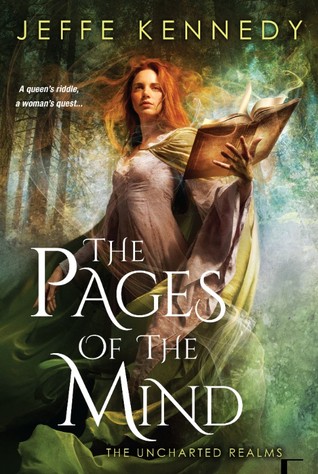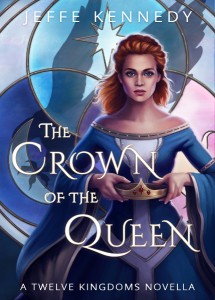 The Pages of the Mind (The Uncharted Realms #1; The Twelve Kingdoms #4) by Jeffe Kennedy
The Pages of the Mind (The Uncharted Realms #1; The Twelve Kingdoms #4) by Jeffe Kennedy Formats available: paperback, ebook
Series: Twelve Kingdoms #4, Uncharted Realms #1
Pages: 432
Published by Kensington on May 31st 2016
Purchasing Info: Author's Website, Publisher's Website, Amazon, Barnes & Noble, Kobo, Bookshop.org
Goodreads
An Orphan's Throne
Magic has broken free over the Twelve Kingdoms. The population is beset by shapeshifters and portents, landscapes that migrate, uncanny allies who are not quite human…and enemies eager to take advantage of the chaos.
Dafne Mailloux is no adventurer--she's a librarian. But the High Queen trusts Dafne's ability with languages, her way of winnowing the useful facts from a dusty scroll, and even more important, the subtlety and guile that three decades under the thumb of a tyrant taught her.
Dafne never thought to need those skills again. But she accepts her duty. Until her journey drops her into the arms of a barbarian king. He speaks no tongue she knows but that of power, yet he recognizes his captive as a valuable pawn. Dafne must submit to a wedding of alliance, becoming a prisoner-queen in a court she does not understand. If she is to save herself and her country, she will have to learn to read the heart of a wild stranger. And there are more secrets written there than even Dafne could suspect…
Praise for The Mark of the Tala
"Magnificent…a richly detailed fantasy world." --RT Book Reviews, 4½ stars, Top Pick
"Well written and swooningly romantic." --Library Journal, starred review
My Review:
 I have, for the most part, adored Jeffe Kennedy’s Twelve Kingdoms series. Ami’s book, The Tears of the Rose, was the lone exception, because Ami spends the first half of the book as a spoiled princess bitch. While she gets much, much better, the first half of the book drags a bit.
I have, for the most part, adored Jeffe Kennedy’s Twelve Kingdoms series. Ami’s book, The Tears of the Rose, was the lone exception, because Ami spends the first half of the book as a spoiled princess bitch. While she gets much, much better, the first half of the book drags a bit.
As much as I loved the bridge novella featuring librarian Dafne Mailloux, The Crown of the Queen, Dafne’s own story in The Pages of the Mind drove me batty. I loved the beginning, and liked the end, but in this case it’s the middle that gave me fits.
Let me explain…
Dafne has been the librarian at Castle Ordnang for decades. Her family held the land and castle that formerly sat on the same spot, but when High King Uorsin decided that Castle Columba would be the seat of his new throne, the end was inevitable. He conquered the castle, razed the building, and built his capital in its place. Daphne was the only member of her family to survive the siege. While she may be, as she says, “ a demon on documents” in her early years it was her ability to hide in plain sight that saved her life over and over.
That and the fact that Queen Salena charged her with caring for her daughters, the princess Ursula, Ami and Andi. Ursula is now High Queen, after the events in The Talon of the Hawk and The Crown of the Queen. It is Daphne’s task to be Ursula’s adviser.
 Dafne has always been an observer and recorder. That’s what librarians do. So Daphne is more surprised than anyone when Ursula tasks her with the position of ambassador, first to the island kingdom of Nahanau, and then to the court of Dasnaria. Nahanau has been damaged by the movement of the magical barrier that formerly surrounded the Tala, and Dasnaria is the home of Ursula’s lover Harlan. His people might ally with the Twelve, now Thirteen Kingdoms, or might attempt to conquer them instead. The Kingdoms are still recovering from the late King’s treachery and tyranny, Ursula needs to stave off that possible war.
Dafne has always been an observer and recorder. That’s what librarians do. So Daphne is more surprised than anyone when Ursula tasks her with the position of ambassador, first to the island kingdom of Nahanau, and then to the court of Dasnaria. Nahanau has been damaged by the movement of the magical barrier that formerly surrounded the Tala, and Dasnaria is the home of Ursula’s lover Harlan. His people might ally with the Twelve, now Thirteen Kingdoms, or might attempt to conquer them instead. The Kingdoms are still recovering from the late King’s treachery and tyranny, Ursula needs to stave off that possible war.
So off Dafne goes, with Harlan’s older brother Prince Kral as escort and guide.
We expect treachery, or at least some double-dealing on Kral’s part. It seems to be what the Dasnarians are known for. So when Kral essentially hands Dafne over to King Nakoa KauPo as either a hostage, sex slave or unwilling bride, readers are not totally surprised.
But the twists and turns that overtake Dafne’s fate from that point forward change the course of her life into directions she never expected. And is never sure that she wants or can even accept.
Escape Rating B-: I loved the beginning. Dafne’s life as librarian turned adviser fit right in with the snippets of her character we have seen in the earlier books. She has been working all of her life towards seeing Ursula crowned High Queen. And she not only expects the job of Royal Adviser, but is totally prepared and qualified for it.
She enjoys being the power behind the throne, and doesn’t see herself as powerful at all. She is merely an instrument of Ursula’s power. And she’s very, very good at it.
But when she is effectively abandoned at the Nahanau court, the story, along with Daphne’s personality, went temporarily off the rails for this reader. Because the story devolved into both the fated mate trope and the magic peen fallacy. That it turns out that both of these issues are actually manipulated into being by a third party redeems things somewhat, but not completely.
Dafne seems to become completely enslaved to sex with King Nakoa, to the point where she loses all her sense at many points. Yes, this sometimes happens when people discover how good sex can actually be, but that level of crazy usually happens earlier in their lives. Dafne is old enough that she believes she is no longer capable of bearing children. Becoming that mushy-headed just didn’t feel right.
For a significant part of the story, Dafne understands little to nothing of the language around her. The Nahanaus speak a language that is not derived from any of the several that Dafne knows. So there is a big portion of the story where a person who is only comfortable when in full possession of all the knowledge available has none to work with. It feels off-character when Dafne is forced to resort to stereotypical feminine wiles that she has never relied upon in order to get information felt wrong.
There is also a huge power imbalance in this relationship. Nakoa essentially kidnaps Dafne and keeps her prisoner. That she falls for him in these circumstances where she is totally dependent on him smacks of Stockholm Syndrome. Which does get called out later in the story, and then all too easily dismissed.
It turns out that everyone in this situation is being manipulated by a third party, one whose eventual advent into the story is explosive enough to kick the story back on track.
One of the things that I liked best about the previous entries in this series is that the princesses did not need to change who they were to find fulfillment and happiness, or to find their equal in love. Dafne has to change completely to get through most of her adventures. It’s only at the end where she goes back to being the intellectual powerhouse that is her true self.
At the end of this story, there are several people still on the loose who seriously need to get their comeuppance, particularly Kral. While events turned out for the best, his duplicity still needs to be accounted for. And I look forward to reading all about it in The Edge of the Blade.


























